For her solo cross-country skate, 26-year-old Calleigh Little packed everything from camping cookware to toilet paper to a stack of energy bars. Among the winter survival supplies, she also brought one vanity item: waterproof liquid eyeliner.
In October, Calleigh left Bend, Oregon, for Boston, Massachusetts, in an ambitious attempt to be the first woman to solo skateboard from coast to coast. But by the end of the first day, she was already exhausted. Though an experienced distance skater, Calleigh wasn’t used to pushing herself for miles with so much extra weight on her back. She had started “on a bad foot, in the most literal way,” she said, with an ankle injury that had left her bedridden for two months before she kicked off the trip.
"I get to be me — I’m Calleigh, I’m trans, I’m feminine, I’m a woman.”
She made it 25 miles on her first day, weaving on and off the shoulder of Oregon’s highways, trying to find the least choppy path for her board. By the time it was dark out, Calleigh dumped most of her supplies, including the toilet paper, the stack of energy bars, and her cookware, on the side of the road. She wrapped everything in a bright orange rain jacket that would also be abandoned and wrote “FREE” in eyeliner on its nylon shell.
“I left anything that was nonessential,” Calleigh reflected a few weeks later. “My rule was, if I’m not using it tonight, I don’t need it.”
Supplies dropped, her pack weighed a total of 35 pounds. But she kept the eyeliner, which was its own kind of survival item.
“I do wear eyeliner every day,” she said on a call from a motel in Idaho, about a week into her skate, where she’d taken a rest day after a particularly rough week of camping. “I think it’s important because as a transgender person, a lot of people call me ‘man.’ Or they’re like ‘he’ and all that. Because I sound like a dude and I’m wearing layers and I probably don’t appear as feminine as I want to, and I put on the makeup. And even if it’s confusing, it’s still good for me because then it opens up a discussion about it. I get to be me — I’m Calleigh, I’m trans, I’m feminine, I’m a woman.”
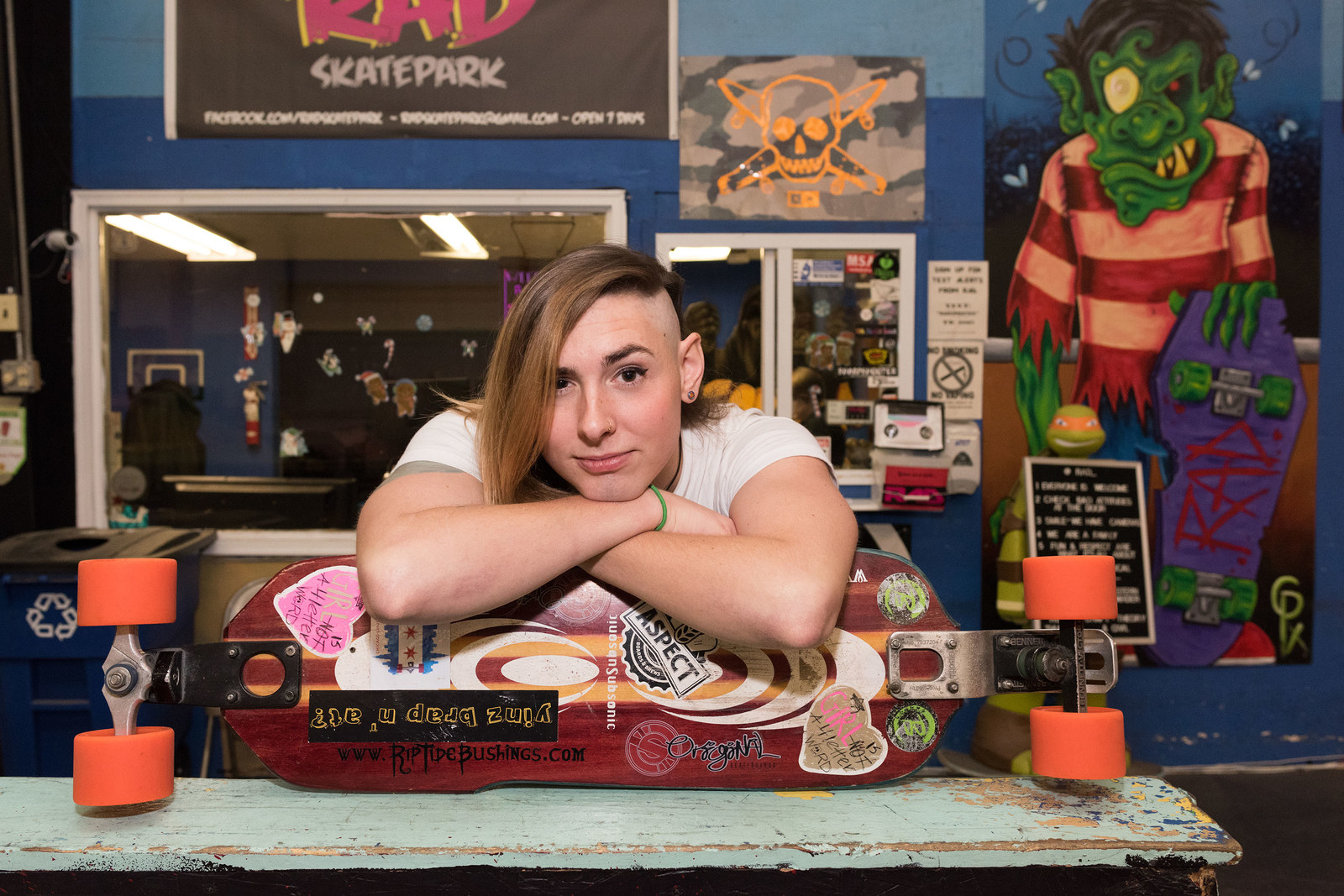
When she was younger, Calleigh didn’t understand why she was drawn to femininity: “It was a time when the internet wasn’t so accessible,” she said. “You know, teens now can log into Tumblr at age 10 and they can search ‘transgender’ and they can find out exactly what it means and say, ‘Oh, I am that way.”
Calleigh started drinking heavily in high school. When she went to college near her hometown in Massachusetts, her drinking got worse. “Trying to fulfill that male role,” she started a fraternity chapter. She couldn’t hold down a job or a relationship, lashed out at her family and fraternity brothers, and “didn’t give a shit about anything.”
While trying to project the model of stereotypical masculinity — building the beer pong table for the fraternity house and leading the brothers during parties — Calleigh was also bringing girls back to her room not to hook up, but to try on their clothes.
“It was just this nagging thought in my head all the time,” Calleigh remembered. “Like I wasn’t living my life, I was living somebody else’s life. And it was, like, this horrible feeling and I never really got a grip on it.”
"I just put all my focus into skateboarding and just kind of let my gender be what it was.”
Overwhelmed by dysphoria, she left the fraternity house without telling any of her roommates and moved back in with her parents. While she was living at home, the horrible feeling “reached its climax,” so she came out to her parents. They didn’t take it well; after she eventually moved out, they didn’t speak to her for two years.
Calleigh began living a “double life,” presenting as a man during the day and sneaking out as a woman to bar hop with close friends at night.
She found a house on Craigslist with an open room and decided that her first day living there would be her first day living fully as a woman. “I wanted to be Lee, because Lee was this girl in college who I was infatuated with. But I can’t be Lee Little, that is the stupidest fucking name ever,” Calleigh laughed. “Then I decided to go with Cali — Calleigh — because California was my dream place to live.”
Calleigh’s drinking didn’t stop. After leaving her friends and breaking off from her family, she lost most of her support network during her transition. “I always felt like a woman,” she said, “but I never had any experiences or influences to help me be accepted as one. And all I had was work and home and work and home and it was so stressful.”
Then she crashed her car into a snowbank and was charged with a DUI. She lost her license, so the only way for her to commute to her restaurant job was to skate the 8 miles there and back.
“It gave me something to focus on that wasn’t my gender and it wasn’t my lack of friends ... so I just put all my focus into skateboarding and just kind of let my gender be what it was.”
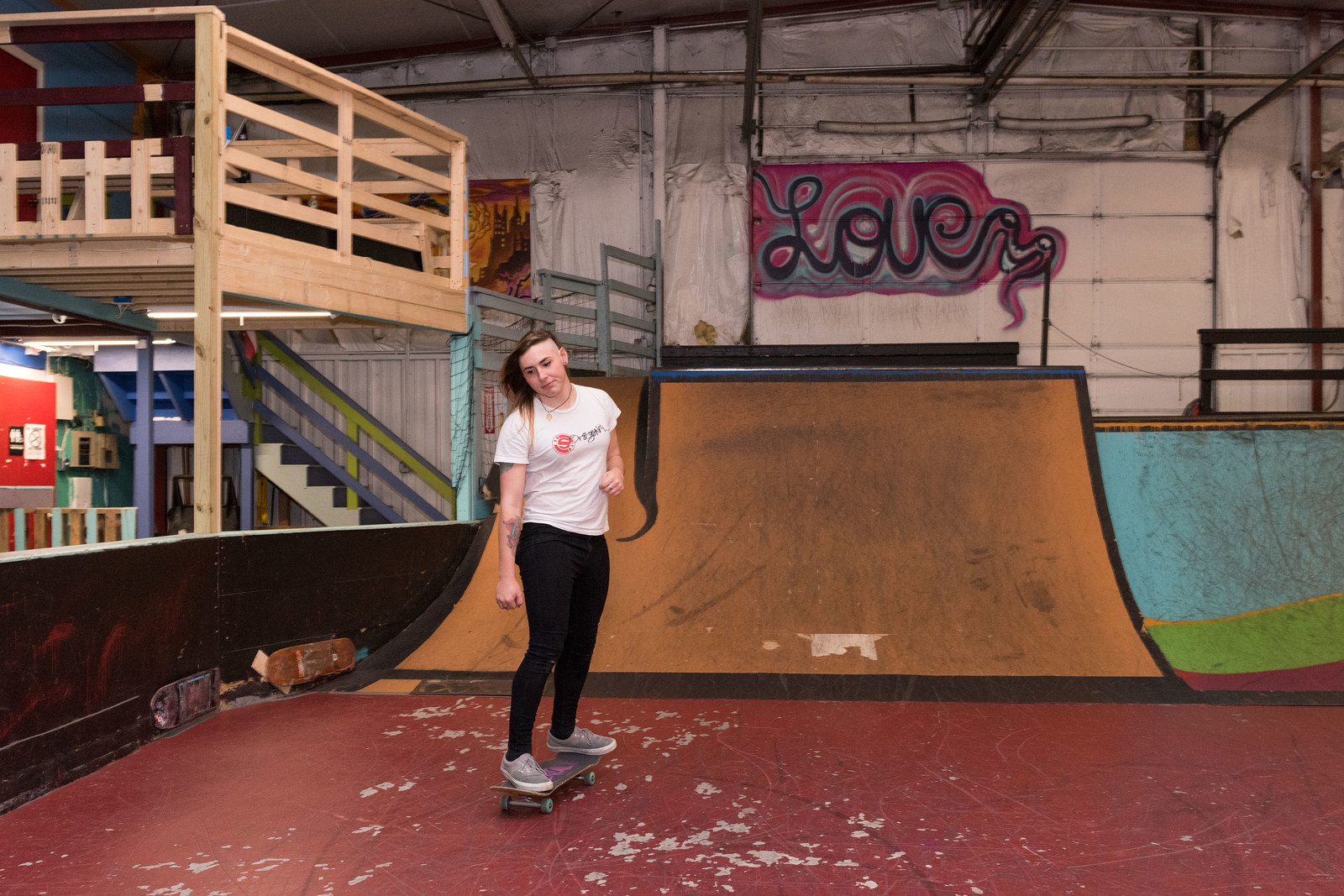
Calleigh moved to Oceanside after she graduated and worked as a social media manager. Living in Southern California was her dream, but she realized she was being pushed out of her company in March 2017. After weeks of locking her out of critical accounts and assigning her duties to outside businesses, the company laid off Calleigh in early May.
She had a bachelor’s degree in communications and searched for careers in her field for the whole summer, but in September had to settle for a position at a burger joint to make ends meet.
Calleigh had been dreaming of a cross-country trip, but it was her fast food job and a recent break up that made her want to do something more with her life.
“I’m not destined to work at a burger place,” she said. “I’m not destined to come home tired every day. I need to do more.”
After a only week of sitting behind the cash register, she decided to leave Oceanside. She planned to quit her job at the end of the month, and began saving every penny she earned until then. In the meantime, she mapped out her route. Within a few weeks she was at her starting point in Oregon, most of her belongings sold or in storage.
“I was on top of the world,” she said. “My body started adjusting, saying, ‘Hey Calleigh, you’re doing this.’”
Though she has an impressive record — she ranked second in the women’s contest at Miami Ultraskate 2017, logging 215 miles, and placed first at Central Mass Skate Festival 8 — her cross-country trip would be tougher than anything she’d ever competed in, taking her through 15 states and about 100,000 feet in elevation. Her route would take her from Oregon to Massachusetts, through the United States’ brutal northern winter. Calleigh would face the possibility of trudging through severe blizzards and sleeping outdoors with only the protection of a tent and her own body heat.
But it was something she needed to do. For her whole life, Calleigh had felt a sense of restlessness and yearned for a nomadic existence. Without a job tying her to one place, she finally had a chance to achieve that dream.
Once she started her trip, “I was on top of the world,” she said. “My body started adjusting, saying, ‘Hey Calleigh, you’re doing this.’”
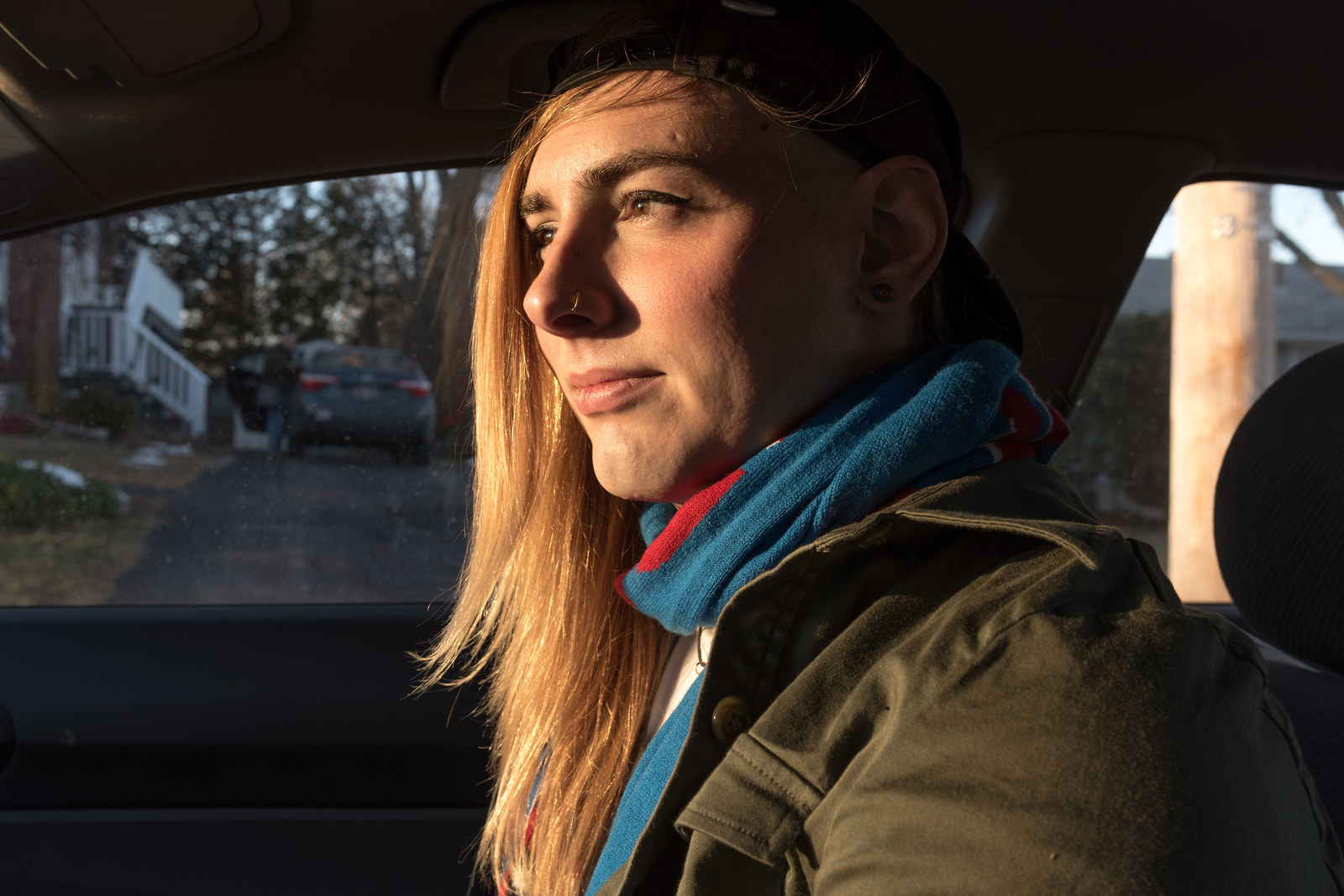
Calleigh’s skate was far from easy. She often camped long nights in below-freezing temperatures and went days without food. When she got to the border of Wyoming, she ran out of drinking water. Although she had found a public campground near the Hoback River to settle down in for the night, its amenities, like water taps and bathrooms, were shut down for the winter. The campground was completely empty, and Calleigh was alone. She called it “a freakin’ nightmare.”
“I wanted to be by the river,” she said, “because there’s nothing worse than being in your tent and hearing something rustling around you. But I could hardly hear the river. I kept hearing noises, and I kept thinking it was a moose or a bear, which are a few things that are going to kill me out here.”
Calleigh was restless. Too scared to sleep, she kept waking up drenched in sweat and “ended up sleeping butt naked in 20-degree weather” because her clothing was so damp. She tossed and turned all night, jolting awake whenever a gust of icy mountain air rushed into her tent.
She made it to daylight without encountering a moose or bear, but a few weeks later she would face another harrowing experience that would nearly kill her: giardia.
Miles from any town and too dehydrated to even hold herself up on her board, Calleigh filled up her bottles with river water. However, she had neglected to familiarize herself with her LifeStraw filter before leaving Oregon, and had no idea how to use it.
“And you know, I was so thirsty,” Calleigh recounted over the phone a few days later, from her rest day in Pinedale, Wyoming, where she finally had a hot meal and befriended a group of game hunters. “The river water was ice cold. It was like a dream come true. It was the clearest, most beautiful water up in Wyoming.”
LifeStraws should be easy to use — the user just needs to hold it vertically in water, let it sit for about 30 seconds, and then sip from the mouthpiece. But Calleigh was exhausted from a night fraught with worrying, and couldn’t figure it out.
“I got really freakin’ pissed,” Calleigh laughed. “And I just, like, smashed it on a rock, screaming my head off.”
She drank the river water without using her LifeStraw, “and oh my god, I can’t even put into words the feeling of having water after not having water for hours and hours and hours. It was like my whole body was rejuvenated.”
Though refreshed, Calleigh couldn’t help but think of the bacteria and parasites she may have ingested. She had a penchant for taking selfies with roadkill “because it’s funny” and considered how close the animals’ bodies were to the water she just drank.
She filled up the rest of her bottles with the river water and continued on her trip, but weeks later came down with a giardia infection that left her with a fever, diarrhea, and excruciating cramps. Crashing at friend’s in Chicago, Calleigh spent two days writhing in bed, self-medicating with Tylenol and vitamin C supplements. She knew she had contracted giardia from the river water, but didn’t have health insurance and couldn’t afford an urgent care visit. She was determined to let the intestinal infection, caused by waterborne parasites, pass without expensive antibiotics.
“How shitty would that be to die in the middle of a pretty populated city when there’s adequate medical care available that I can’t afford?”
“I thought I was going to have to quit and go home. Take a Greyhound or fly home or something. I’ve never given up on anything before, so it wasn’t really an option for me, but I was just worried,” Calleigh said. “How shitty would that be to die in the middle of a pretty populated city when there’s adequate medical care available that I can’t afford?”
Soon after starting her trip, she gave up on trying to beat the world record; starting out with an ankle injury, camping during the quickly approaching winter, and contracting giardia held her back from skating the entirety of the United States by herself. During heavy blizzards when piling snow jammed her board, Calleigh caught rides with truckers. When she realized that skating through the mountains of Pennsylvania would take another two weeks, while still recovering from the infection, she bought a bus ticket.
But not skating the entire route had its benefits. She thought if she had rushed through the trip, she would have had a lonelier experience. She posted on her GoFundMe page, “It was preposterous to think I could skate with my head down and ignore the amazing people I ran into along the way.” Getting to Boston became less about breaking records and more about stepping out of her comfort zone as a transgender woman.
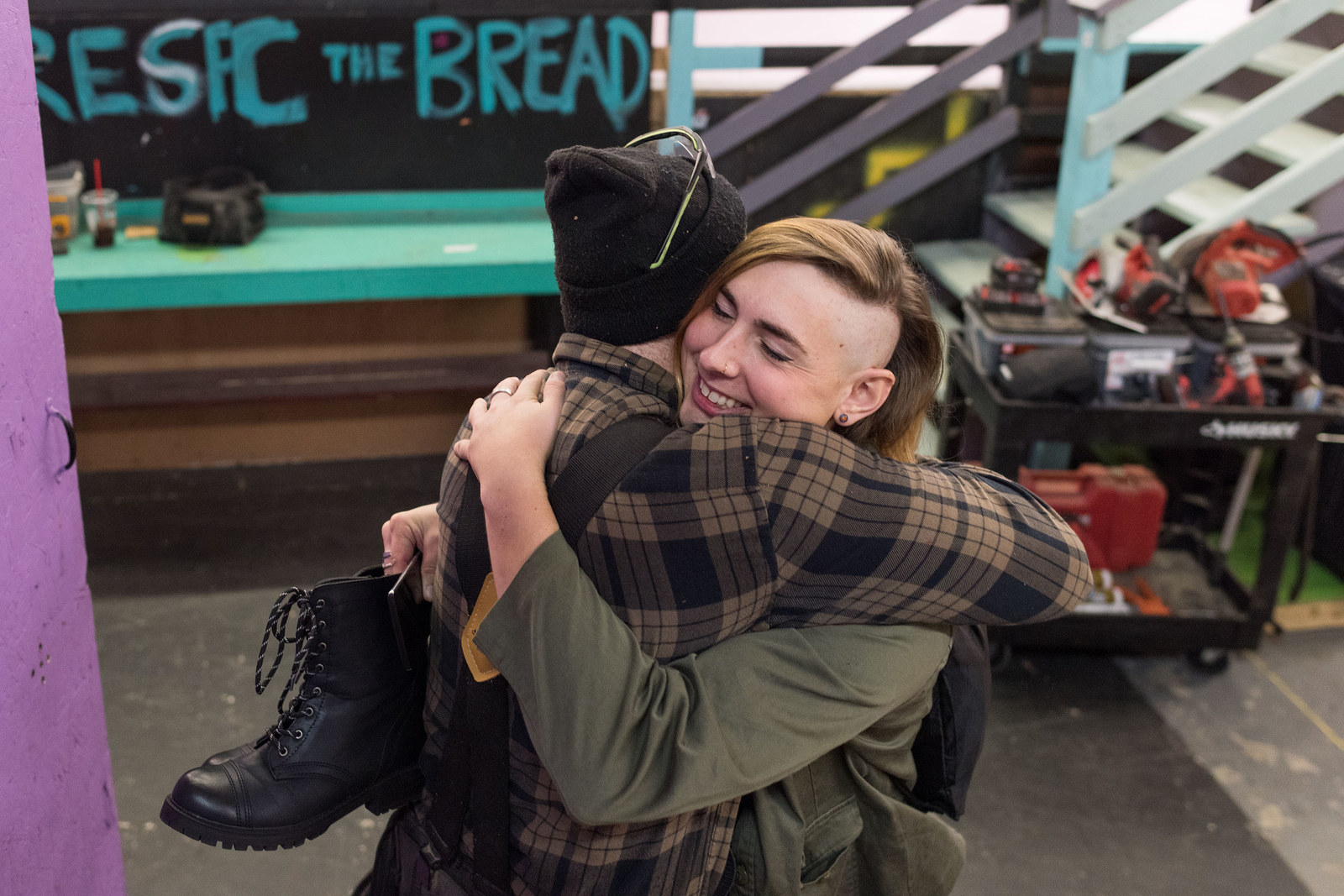
During her cross-country skate, Calleigh encountered many people who were confused by her appearance or misgendered her, but she managed to brush most of it off. In some cases, however, Calleigh retaliated.
During an open mic in Indiana, a man made a joke about how he’d slept with a 67-year-old transgender woman, but “it was okay because her vagina was new, so it was like having sex with a 6-year-old.”
“It was not a funny joke,” Calleigh told me. “So I went up and pushed him, and basically got him into a headlock.” A brawl broke out, with the whole bar joining in on the fight. Calleigh managed to slip out before catching any serious punches.
It wasn’t first time Calleigh had dealt with insensitivity or discrimination, and it wouldn’t be her last.
Finding a place to stay as a trans woman was also a challenge — it was so cold that camping was usually unbearable and motels were a luxury Calleigh couldn’t afford, so she couch surfed. In Nebraska, she swiped right on everyone on Tinder until a match offered her a warm bed. “He was also really hot,” Calleigh said. “And it kind of just went from there.”
She had less luck in Indiana; a stranger rescinded her offer of a couch and hot shower after Calleigh said she was trans. “I was just reminded that I have an obligation tonight,” the stranger texted Calleigh. “I won’t be able to host you.”
“Lol,” Calleigh wrote back. “Hopefully ill freeze my boobs and dick off thanks.”
But other parts of America welcomed Calleigh. Truckers picked her up and bought her meals. Rowdy bar patrons befriended her, fascinated by her cross-country stories. A girl in Chicago gave up her own bed so Calleigh could rest and recover from giardia. On Thanksgiving Day, she skated through Greenfield, New York, a town about 40 miles north of Albany. She expected to spend the night camping alone, but a woman driving past Calleigh pulled over and insisted on bringing her to the town-wide dinner, where everyone seemed to be related.
"I crossed the finish line and I didn’t even know I was over it. And I was like, oh my god, I did it!”
Calleigh caught a ride to New York City and, from there, a bus to Providence, Rhode Island. She skated the last 50 miles to Boston, where she crossed the Boston Marathon finish line, 48 days after leaving Bend.
“I was just so focused,” she said. “I just kept thinking, One more push, one more push. If I make it to the end I don’t have to anymore ... I crossed the finish line and I didn’t even know I was over it. And I was like, oh my god, I did it!”
Exhilarated, Calleigh stopped just after the finish line and football-spiked her board in the middle of Boylston Street. Her backpack was so heavy that she fell over, and her waiting friends dumped a bottle of champagne over her head. “It felt good, you know,” she said, calling from her parents’ house in Massachusetts.
She described her finish line story wistfully. Since finishing her skate, Calleigh had been feeling “twice as lost” as she felt when she started. She was living in her childhood home again — her family had come to terms with her gender and welcomed her back.
Two years after Calleigh moved out, her mother gifted her a peace offering: a Christmas ornament of a high heel with “Calleigh” engraved on it. They grew close when Calleigh moved to California, catching up over the phone often and “talking like family.” Her relationship with her father remains rocky; she said when he drinks he purposely misgenders her and calls her by her birth name. “He’s okay as a father but my gender identity isn’t something he’ll ever meet me in the middle on,” she said.
Crashing on her parents’ couch, since her three brothers also live at home, she was listless. Without a job and without a destination to skate to, Calleigh had little routine to define her days. She wrote on her blog, “I was no longer an adventurer, merely just someone who had nowhere else to go.”
A few days before her latest blog post, Calleigh reflected on going from surviving day to day, to finally having a safe place to sleep every night.
“I would rather be surviving in the wild,” she said without any hesitation. “Out there it was just me, myself, and whatever challenge I had ahead of me.”
It was unusually warm for November in Massachusetts, so Calleigh was calling from the yard of her parents’ house. Her brothers’ trailer was still parked in the family’s driveway, and the slight New England breeze could be heard through the phone. “Now it’s me, and this whole world that I don’t even want to be a part of.”
Calleigh planned on competing in Miami’s Ultraskate in January — and would later come in first place in the women’s division — but needed a way to get there. She had burned through her savings and her cell phone service was dangerously close to being cut off. She had bills to pay and a job to find, but she was still determined to find another adventure.
“Many people say home is where the heart is,” Calleigh posted on Facebook, two weeks after her triumphant return to Boston. “But I’m pretty sure I dragged my heart across the entire country and left the pieces behind.” ●
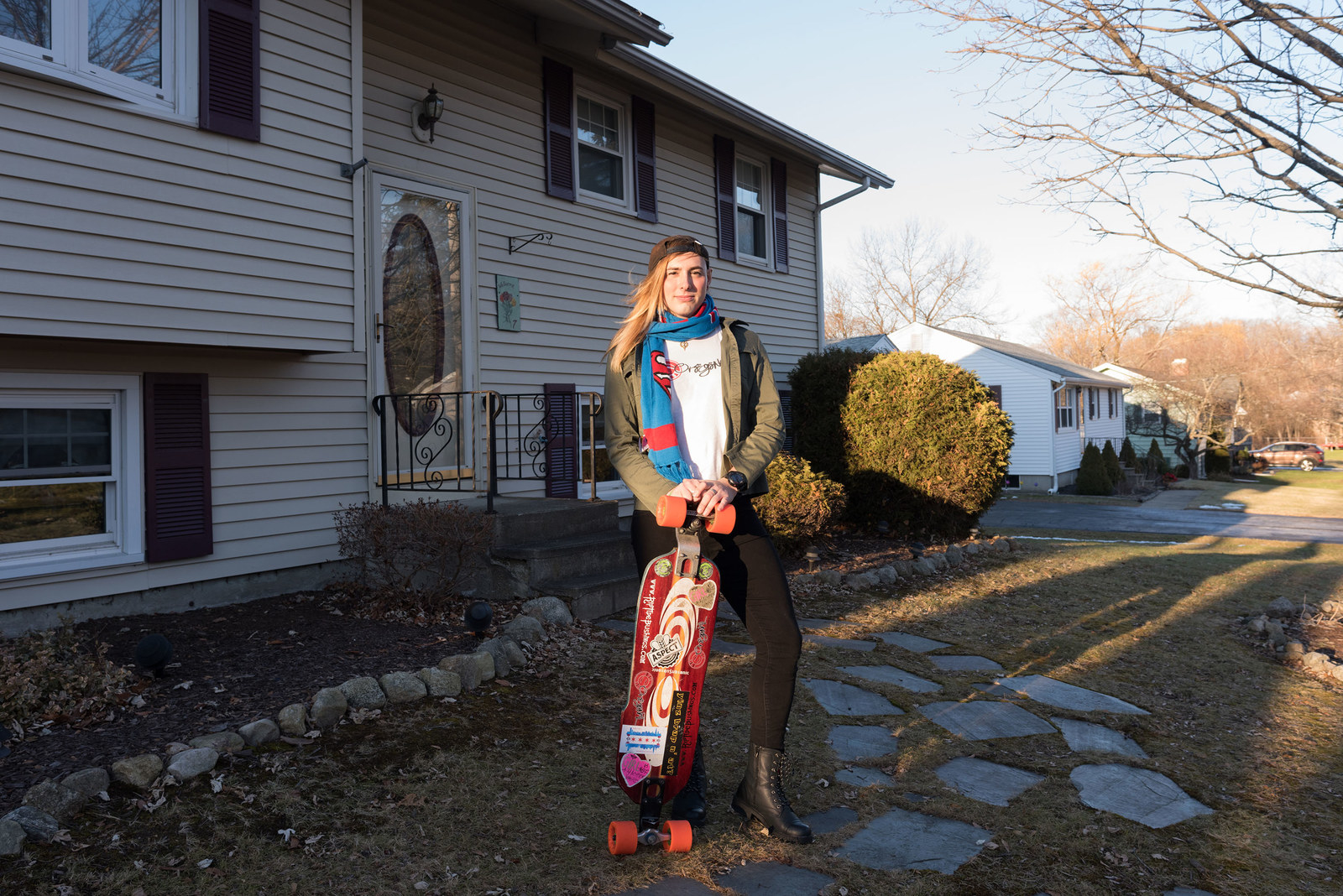
This essay is part of a series of stories about travel.

